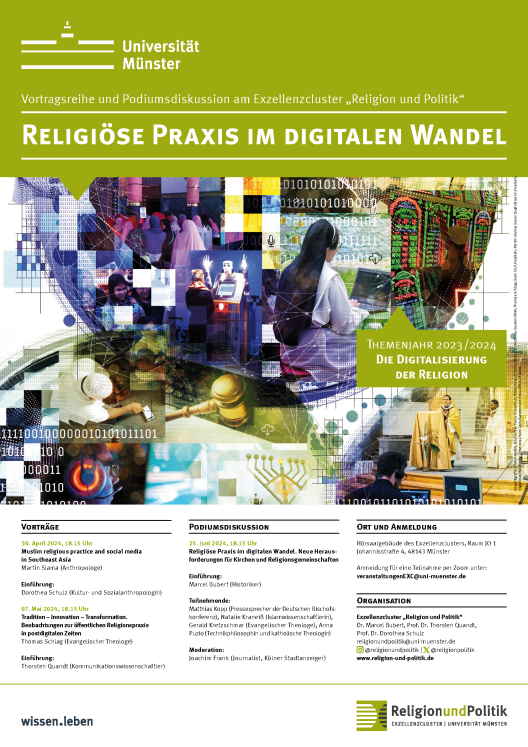Virtual prayers, online confessionals, fatwas on the internet
The summer term sees the Cluster of Excellence “Religion and Politics” focus on how digitalization is transforming religious practice – Panel and lecture series “Religious practice in digital transformation” begins on 30 April – Panel discussion featuring academics and religious figures

Press release April 23, 2024
Whether virtual prayers, online confessionals or fatwas on the internet, the Cluster of Excellence “Religion and Politics” at the University of Münster is focusing in the summer term of the annual theme “The Digitalization of Religion” on the challenges and opportunities that religious communities have as a result of the digital transformation. As announced by communication scientist Thorsten Quandt from the Cluster of Excellence, a panel and lecture series entitled “Religious practice in digital transformation” will begin on 30 April and will explore new forms of religion on the web and social media, apps and AI from a range of different perspectives. “Religion and digital transformation are often seen as opposites. But religious organizations, authorities and groups deal with the opportunities offered by digitalization in very different ways: some persist with analogue, while others make extensive use of new digital resources”.
“Some religious communities mainly see the challenges or even risks posed by the possible dissolution of established structures, as well as competition from new quasi-religious systems of meaning in the digital world”, explains Quandt. “Others, though, have highlight the chance for churches and religious communities to use digital resources to open up new spaces for people to come together and participate religiously. Church services and prayers transmitted digitally, personalized online information for interpreting religious texts, automated advice on spiritual matters, online confessionals and religious chat groups – these are just some of the resources that religious communities are using to create new ways for people to participate and belong”.
The panel discussion on 25 June will feature philosopher of technology and Catholic theologian Anna Puzio, press speaker of the German Bishops’ Conference Matthias Kopp, Islamic scholar Natalie Kraneiß, and Protestant theologian Gerald Kretzschmar. The discussion will be introduced by historian Marcel Bubert and moderated by Joachim Frank from the Kölner Stadt-Anzeiger newspaper. Both the panel discussion and the lectures on 30 April and 7 May will take place in room JO 1 in the Cluster of Excellence lecture building (Johannisstraße 4, 48143 Münster). If you wish to participate via Zoom, then please register beforehand at: veranstaltungenEXC@uni-muenster.de.
The panel discussion will focus on how different religious organizations deal with the challenges of digital transformation. “Religious communities are caught between tradition and innovation”, explains historian Marcel Bubert, who will introduce the discussion. “On the one hand, new digital resources can be used to mobilize the faithful and create new ways for people to participate in religion; on the other, they can also be seen as endangering conventional rituals and religious practices”.
The lectures in the series also take different perspectives on the digital transformation of religious practice. “Social anthropologist Martin Slama, for example, will explore the role that the use of social media by Muslims plays in changing religious practice in Indonesia”, explains social anthropologist Dorothea Schulz, who will introduce the first evening of lectures. “The Protestant theologian Thomas Schlag, on the other hand, will explore the effects of religious transformations, for example on the public visibility of religious organizations, and the new challenges for religious communities that this brings”. (fbu/pie/vvm)
Lectures:
30 April 2024, 6 pm – Muslim religious practice and social media in Southeast Asia
Martin Slama (social anthropologist, Austrian Academy of Sciences, Vienna)
7 May 2024, 6 pm – Tradition – Innovation – Transformation: Observations on public religious practice in the post-digital era
Thomas Schlag (Protestant theologian, University of Zurich)
Panel discussion:
25 June 2024, 6 pm – Religious practice in digital transformation: New challenges for churches and religious communities
Matthias Kopp (press speaker of the German Bishops’ Conference, Bonn), Natalie Kraneiß (Islamic scholar, University of Münster), Gerald Kretzschmar (Protestant theologian, University of Tübingen), Anna Puzio (philosopher of technology and Catholic theologian, University of Twente)

